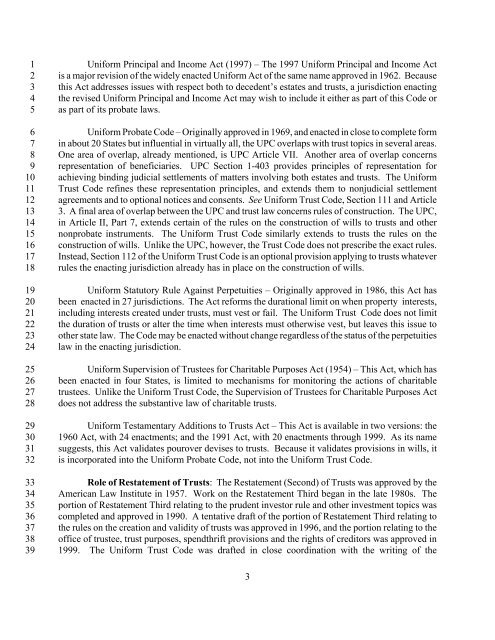uniform trust code - Kansas Judicial Branch
uniform trust code - Kansas Judicial Branch
uniform trust code - Kansas Judicial Branch
Create successful ePaper yourself
Turn your PDF publications into a flip-book with our unique Google optimized e-Paper software.
1<br />
2<br />
3<br />
4<br />
5<br />
6<br />
7<br />
8<br />
9<br />
10<br />
11<br />
12<br />
13<br />
14<br />
15<br />
16<br />
17<br />
18<br />
19<br />
20<br />
21<br />
22<br />
23<br />
24<br />
25<br />
26<br />
27<br />
28<br />
29<br />
30<br />
31<br />
32<br />
33<br />
34<br />
35<br />
36<br />
37<br />
38<br />
39<br />
Uniform Principal and Income Act (1997) – The 1997 Uniform Principal and Income Act<br />
is a major revision of the widely enacted Uniform Act of the same name approved in 1962. Because<br />
this Act addresses issues with respect both to decedent’s estates and <strong>trust</strong>s, a jurisdiction enacting<br />
the revised Uniform Principal and Income Act may wish to include it either as part of this Code or<br />
as part of its probate laws.<br />
Uniform Probate Code – Originally approved in 1969, and enacted in close to complete form<br />
in about 20 States but influential in virtually all, the UPC overlaps with <strong>trust</strong> topics in several areas.<br />
One area of overlap, already mentioned, is UPC Article VII. Another area of overlap concerns<br />
representation of beneficiaries. UPC Section 1-403 provides principles of representation for<br />
achieving binding judicial settlements of matters involving both estates and <strong>trust</strong>s. The Uniform<br />
Trust Code refines these representation principles, and extends them to nonjudicial settlement<br />
agreements and to optional notices and consents. See Uniform Trust Code, Section 111 and Article<br />
3. A final area of overlap between the UPC and <strong>trust</strong> law concerns rules of construction. The UPC,<br />
in Article II, Part 7, extends certain of the rules on the construction of wills to <strong>trust</strong>s and other<br />
nonprobate instruments. The Uniform Trust Code similarly extends to <strong>trust</strong>s the rules on the<br />
construction of wills. Unlike the UPC, however, the Trust Code does not prescribe the exact rules.<br />
Instead, Section 112 of the Uniform Trust Code is an optional provision applying to <strong>trust</strong>s whatever<br />
rules the enacting jurisdiction already has in place on the construction of wills.<br />
Uniform Statutory Rule Against Perpetuities – Originally approved in 1986, this Act has<br />
been enacted in 27 jurisdictions. The Act reforms the durational limit on when property interests,<br />
including interests created under <strong>trust</strong>s, must vest or fail. The Uniform Trust Code does not limit<br />
the duration of <strong>trust</strong>s or alter the time when interests must otherwise vest, but leaves this issue to<br />
other state law. The Code may be enacted without change regardless of the status of the perpetuities<br />
law in the enacting jurisdiction.<br />
Uniform Supervision of Trustees for Charitable Purposes Act (1954) – This Act, which has<br />
been enacted in four States, is limited to mechanisms for monitoring the actions of charitable<br />
<strong>trust</strong>ees. Unlike the Uniform Trust Code, the Supervision of Trustees for Charitable Purposes Act<br />
does not address the substantive law of charitable <strong>trust</strong>s.<br />
Uniform Testamentary Additions to Trusts Act – This Act is available in two versions: the<br />
1960 Act, with 24 enactments; and the 1991 Act, with 20 enactments through 1999. As its name<br />
suggests, this Act validates pourover devises to <strong>trust</strong>s. Because it validates provisions in wills, it<br />
is incorporated into the Uniform Probate Code, not into the Uniform Trust Code.<br />
Role of Restatement of Trusts: The Restatement (Second) of Trusts was approved by the<br />
American Law Institute in 1957. Work on the Restatement Third began in the late 1980s. The<br />
portion of Restatement Third relating to the prudent investor rule and other investment topics was<br />
completed and approved in 1990. A tentative draft of the portion of Restatement Third relating to<br />
the rules on the creation and validity of <strong>trust</strong>s was approved in 1996, and the portion relating to the<br />
office of <strong>trust</strong>ee, <strong>trust</strong> purposes, spendthrift provisions and the rights of creditors was approved in<br />
1999. The Uniform Trust Code was drafted in close coordination with the writing of the<br />
3

















